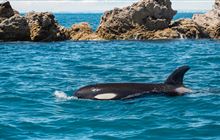Update on lone orca calf
Archived content: This media release was accurate on the date of publication.
Introduction
The Orca Tactical Response Group responding to the abandoned orca in the Bay of Plenty are intervening to benefit the calf’s wellbeing.Date: 02 August 2016 Source: Orca Tactical Response Group: DOC is working with iwi, the Orca Research Trust and the local community as part of the Orca Tactical Response Group. This is the latest media release from the group.
The young calf has been in the area since July 19. By enlisting support from the community to find its pod, reports of orca pods have been coming in giving hope the calf might be reunited with its family in the near future.
“Iwi are working hard as part of the Orca Tactical Response Group (OTRG) to explore the next steps towards helping this maki. We’re lining up resources to build a sea pen with the hope that the OTRG can safely move the calf. Ko te hauora o te Maki te aro matua ki tenei wa”, says iwi representative Reon Tuanau.
A sea pen is likely to mitigate stress to the animal from the strong tidal flows in its current location.
Orca experts Jeff Foster and Dr Ingrid Visser have already taken non-invasive intervention steps and attempts to feed the calf were unsuccessful. A respiratory sample and DNA sample have been collected from the orca and it is hoped the results will be available soon.
“At this point, the calf is emaciated and we haven’t been able to locate its family pod. We need to consider the safety of the public and responders, and the welfare of the whale as we implement further actions of the response”, explained incident controller John Lucas.
“DOC has a standard operating procedure for marine mammal incidents which has been created with the best interests of marine mammals at its core. The current situation is quite unique and we’re fortunate to have the expertise of Jeff Foster and Dr Visser to help us move into the next stages of the response.”
The tidal flow, weather, available resources and situation of the calf will determine the plausibility of future developments.
The local community is committed to providing practical support for as long as is required to help ensure the best outcome for the young orca. Residents are currently providing accommodation, transport and provisions for the Orca Research Trust team and expert personnel bought in to assist with this task.
Contact
Caraline Abbott, DOC Supervisor, Community
Mobile: +64 21 0296 5019

